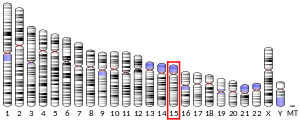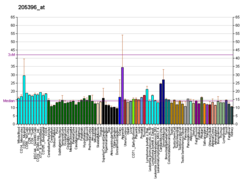Mothers against decapentaplegic homolog 3 also known as SMAD family member 3 or SMAD3 is a protein that in humans is encoded by the SMAD3 gene.[5][6]
SMAD3 is a member of the SMAD family of proteins. It acts as a mediator of the signals initiated by the transforming growth factor beta (TGF-β) superfamily of cytokines, which regulate cell proliferation, differentiation and death.[7][8] Based on its essential role in TGF beta signaling pathway, SMAD3 has been related with tumor growth in cancer development.
- ^ a b c GRCh38: Ensembl release 89: ENSG00000166949 – Ensembl, May 2017
- ^ a b c GRCm38: Ensembl release 89: ENSMUSG00000032402 – Ensembl, May 2017
- ^ "Human PubMed Reference:". National Center for Biotechnology Information, U.S. National Library of Medicine.
- ^ "Mouse PubMed Reference:". National Center for Biotechnology Information, U.S. National Library of Medicine.
- ^ "Entrez Gene: SMAD3 SMAD family member 3".
- ^ Zhang Y, Feng X, We R, Derynck R (September 1996). "Receptor-associated Mad homologues synergize as effectors of the TGF-beta response". Nature. 383 (6596): 168–172. Bibcode:1996Natur.383..168Z. doi:10.1038/383168a0. PMID 8774881. S2CID 4306019.
- ^ Massagué J (1998). "TGF-beta signal transduction". Annual Review of Biochemistry. 67 (1): 753–791. doi:10.1146/annurev.biochem.67.1.753. PMID 9759503.
- ^ Moustakas A, Souchelnytskyi S, Heldin CH (December 2001). "Smad regulation in TGF-beta signal transduction". Journal of Cell Science. 114 (Pt 24): 4359–4369. doi:10.1242/jcs.114.24.4359. PMID 11792802.







